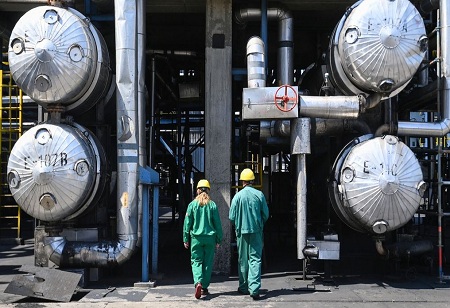India's fondness of discounted Russian oil is increasing its trade deficit with Moscow, and the much-heralded rupee trade strategy is suffering as a result. The local currency payment mechanism is useless as a result of the growing trade deficit between their exports and imports, according to sources with knowledge of the situation who asked to remain anonymous because the talks are private. No payment has been initiated, according to Russian banks, who do not want surplus rupee to amass.
New Delhi's imports from Russia in the eight months leading up to November were about 16 times greater than its exports. Rupee trading began to take shape as a result of Russia's conflict with Ukraine, which prompted US-led sanctions and drove India to increase its purchases of inexpensive oil from Moscow in order to reduce its import bill in the face of rising commodity prices. The system served as a model for creating such agreements with other countries like Sri Lanka and Mauritius. Slow trade
developments between the rupee and Russia might put additional pressure on the local currency, which has fallen the most against the dollar among emerging Asian currencies in the last year. After its current account deficit, the broadest indicator of trade in goods and services, extended to a record in July-September, India is relying on the internationalisation of the rupee to lower dollar demand and lessen the vulnerability of its economy to external shocks.
Officials from the two countries met last month to discuss methods to increase exports to Russia in industries like electronics in order to restart the rupee trade mechanism while traders consider alternative modes of payment. The Reserve Bank of India declared its intention to permit settlement of international trade in rupees in July. The system is mostly restricted to payments for the import of defence equipment, according to the persons, seven months later.
Refiners prefer to pay in the United Arab Emirates dirham, which is pegged to the dollar, a Bharat Petroleum Corp. Ltd. executive who did not want to be named said, adding that payment in rubles is difficult because there is no set exchange rate for the currency. Reliance Industries Ltd., the largest firm in India by market value, and BPCL are two Indian refiners who use dirhams to pay for some shipments of Russian petroleum in order to avoid Western sanctions.
Even though petroleum remains the main commodity traded between the two countries, imports of goods like fertiliser and sunflower oil have increased recently. As a result, India's imports from Russia increased by more than 400% in the eight months leading up to November compared to the same period last year, while exports decreased by 14%, indicating that the government's efforts to increase outbound shipments had little success. Ajay Sahai, director general and chief executive officer of the Federation of Indian Export Organizations, stated, "As far as we know, there has not been any transaction in Indian rupees so far."
